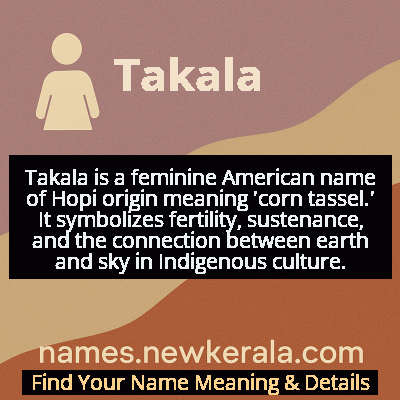Takala Name Meaning & Details
Origin, Popularity, Numerology Analysis & Name Meaning of Takala
Discover the origin, meaning, and cultural significance of the name TAKALA. Delve into its historical roots and explore the lasting impact it has had on communities and traditions.
Name
Takala
Gender
Female
Origin
American
Lucky Number
1
Meaning of the Name - Takala
Takala is a feminine American name of Hopi origin meaning 'corn tassel.' It symbolizes fertility, sustenance, and the connection between earth and sky in Indigenous culture.
Takala - Complete Numerology Analysis
Your Numerology Number
Based on Pythagorean Numerology System
Ruling Planet
Sun
Positive Nature
Leaders, ambitious, highly driven, self-reliant, innovative.
Negative Traits
Overly aggressive, domineering, impatient, selfish.
Lucky Colours
Red, orange, gold.
Lucky Days
Sunday.
Lucky Stones
Ruby, garnet.
Harmony Numbers
2, 3, 9.
Best Suited Professions
Entrepreneurs, managers, engineers.
What People Like About You
Courage, determination, leadership.
Famous People Named Takala
Takala Blackwood
Indigenous rights activist
Founded the Native Women's Education Initiative
Takala Morning Star
Potter and artist
Preserved traditional Hopi pottery techniques while incorporating modern designs
Takala Redbird
Environmental scientist
Led sustainable agriculture projects in Southwestern communities
Takala Summer Rain
Educator and author
Developed culturally-responsive curriculum for Indigenous youth
Name Variations & International Equivalents
Click on blue names to explore their detailed meanings. Gray names with will be available soon.
Cultural & Historical Significance
As a female name, Takala embodies the nurturing qualities associated with corn cultivation and the vital role women play in maintaining cultural traditions and food sovereignty. The name carries generations of agricultural wisdom and spiritual understanding, connecting the bearer to ancestral practices that have sustained the Hopi people for centuries. In contemporary Indigenous communities, choosing this name represents a commitment to preserving cultural knowledge and honoring the deep relationship between people, plants, and the land that has defined Hopi identity for generations.
Extended Personality Analysis
Women named Takala are often perceived as nurturing, grounded individuals with a strong connection to nature and community. They typically exhibit patience and resilience, much like the corn plant that grows steadily through changing seasons. Their personality often reflects the symbolic qualities of the corn tassel - they serve as connectors within their social circles, bridging different groups and ideas while maintaining their own strong identity. Takalas are frequently described as practical yet spiritual, balancing earthly concerns with higher principles.
These individuals tend to be resourceful problem-solvers who approach challenges with the same methodical care that traditional farmers apply to their crops. Their strength lies in their ability to sustain others emotionally and spiritually, much like corn sustains physically, while maintaining grace under pressure and adapting to life's changing circumstances. People with this name often demonstrate a quiet confidence and deep-rooted sense of purpose, embodying the idea that true strength comes from within and develops gradually over time, mirroring the growth pattern of the corn plant they're named for.
Modern Usage & Popularity
In contemporary times, Takala remains a relatively uncommon but meaningful choice, primarily within Indigenous communities and among parents seeking names with natural significance and cultural depth. The name has seen a slight increase in usage as interest in Indigenous names and sustainable living has grown, though it maintains its distinctive character by not becoming overly popular. It's particularly favored among families with connections to Southwestern cultures or those who value agricultural heritage and environmental consciousness. While not appearing on mainstream popularity charts, Takala represents a trend toward names that honor specific cultural traditions rather than following mass naming trends. The name appeals to parents looking for something unique yet deeply meaningful, with strong connections to nature, sustenance, and cultural continuity in an era increasingly concerned with environmental sustainability and cultural preservation.
Symbolic & Spiritual Meanings
Symbolically, Takala represents fertility, abundance, and the interconnectedness of all life. The corn tassel serves as a bridge between earth and sky, making the name emblematic of mediation and connection between different realms or perspectives. It symbolizes the idea that from small, seemingly insignificant beginnings (like a seed) great sustenance and beauty can grow with proper care and patience. The name carries connotations of resilience and adaptability, as corn must weather various conditions to reach maturity while maintaining its essential nature. In a broader sense, Takala symbolizes cultural preservation and the passing down of traditional knowledge from one generation to the next, much like heirloom corn varieties are preserved and replanted season after season. The name embodies the concept of sustainable growth and the wisdom that true abundance comes from working in harmony with natural cycles rather than seeking quick results.

